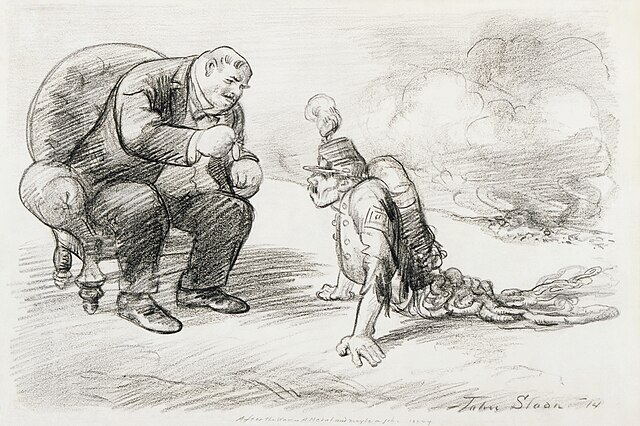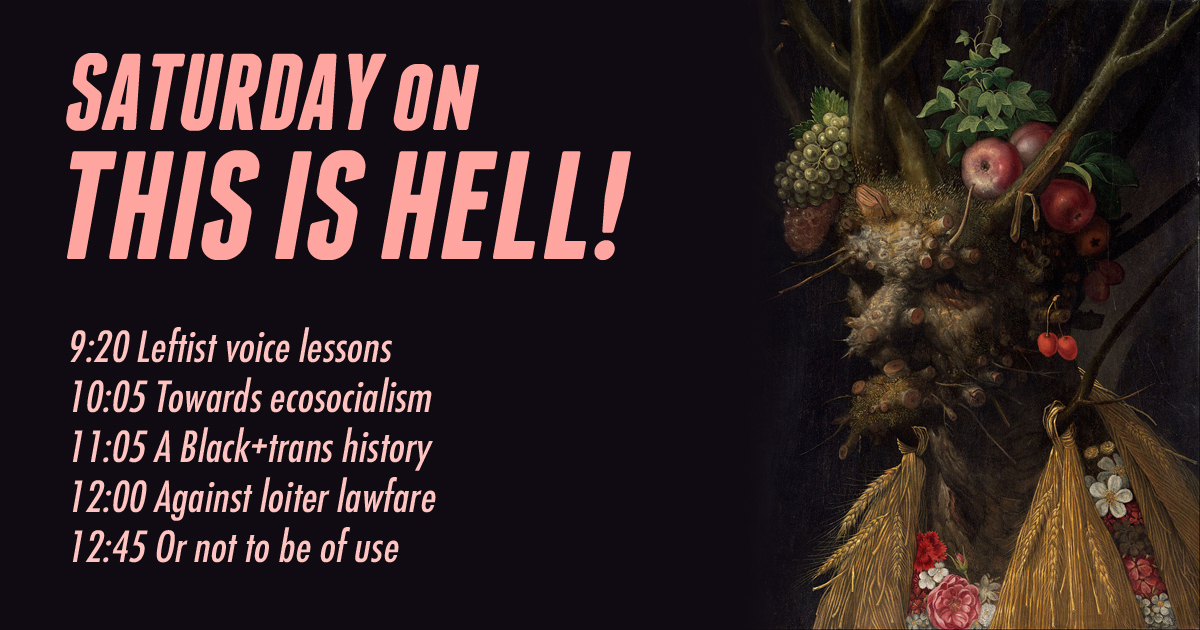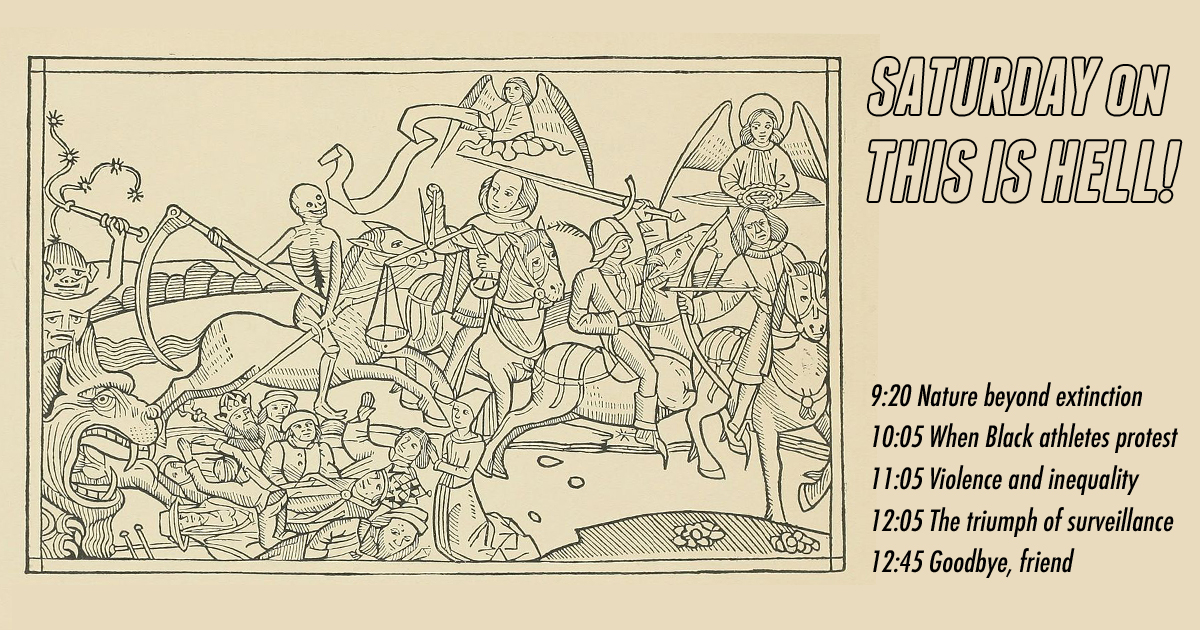Welcome to the Moment of Truth: the thirst that is the drink.
The late champion of liberal democratic rationalism, Karl Popper, said, "[I]f we are not prepared to defend a tolerant society against the onslaught of the intolerant, then the tolerant will be destroyed, and tolerance with them... we should claim the right to suppress [the intolerant] if necessary even by force; for it may easily turn out that they are not prepared to meet us on the level of rational argument, but begin by denouncing all argument[.]"
Two groups are at odds these days: the MAGAts, and everyone else. MAGAts can often be identified by their red baseball caps with the words "Make America Great Again" in white letters above the bill. The caps are worn to protest the loss of US manufacturing jobs to China, and are manufactured in China. Not true, according to Snopes. But believable. Truthy!
MAGAts don't always wear hats. They can also be identified by their ideological and aspirational fealty to a sleazy real estate developer, who was born with a fake Rolex on his wrist and mentored by Senator Joe McCarthy's scummy lawyer, Roy Cohn – himself such a caricature of a slimy shyster that even the swarthiest Jews in the arms-for-blood-diamonds business are offended by having to share a cultural identity with him. This sleazy real estate developer, who goes by the name Donald Dump, sports a comb-over of bottle-blond fibers that renders his appearance a perfect metaphor for his moral character as well as his aesthetic taste. Donald Dump found Liberace's domestic decor understated.
MAGAts believe that immigrants and other foreigners, rather than the finance industry, overweening corporations, and self-aggrandizing mega-robber-barons, are to blame for workers' depressed wages, buying power, and standard of living in the United States, and they've finally elected someone as their Leader who will not only feed them this line of monkey gland sauce they find so delicious, but even take bold steps to put on scattered Lysenko-esque showcase versions of remedying what is actually not the problem.
In a global civilization slowly killing itself with fossil fuel emissions, industrial fertilizer and cattle farts, MAGAts believe the answer to all their problems is a bloated John Jacob Astor/Benito Mussolini hybrid reviving the coal industry, so that we may return the once great American sky to its once great condition as a gray- black death shroud over... read more
Listen live from 9AM - 1:00PM Central on WNUR 89.3FM / stream at www.thisishell.com / subscribe to the podcast
9:20 - Economist Mark Weisbrot examines the US hand in Latin American politics across the 21st century.
Mark wrote the essay A Note about “Our Backyard”: Advice that Thomas Shannon Might Give to Mike Pompeo for CEPR.
10:05 - Attorney Flint Taylor follows the long, living legacy of police torture in Chicago.
Flint's book The Torture Machine: Racism and Police Violence in Chicago is out later this year via Haymarket Books.
10:35 - Journalist Drew Philp talks about building a house and rebuilding a community in Detroit.
Drew is author of A $500 House in Detroit: Rebuilding an Abandoned Home and an American City from Scribner.
11:05 - Historian Lilian Calles Barger explores the past (and future) of the liberation theology movement.
Lilian is author of The World Come of Age: An Intellectual History of Liberation Theology from Oxford University Press.
12:05 - The Hopleaf's Michael Roper discusses sell-outs and shut-downs in the late stage craft beer market.
Michael is the proprietor of The Hopleaf Bar in Chicago's Andersonville neighborhood. Try the Bitterballen.
12:45 - In a Moment of Truth, Jeff Dorchen puts a Great Thinker's words into worst practices.
Jeff said I wasn't gonna like this one, really looking forward to it!
Welcome to the Moment of Truth: the thirst that is the drink.
Talking with some of the regulars at Lily's Coffee at the Laurel Canyon Country Store Monday morning, I was led to an epiphany of sorts. You know how I love my epiphanies. We were talking about how pet philosophies seem to wear out their usefulness after a while. Obviously this isn't something that troubles philosophers who spend their lives developing their thought shenanigans, but for those of us groping through the fever of our lives, merely splashing our faces with philosophies here and there, who don't have the time or desire to dive deep into the currents of thought, for us a thought-pool like Existentialism or Stoicism, used as a handy refresher of perspective skimmed off the surface of better thinkers' deeper explorations – well, we go through these like Wet Wipes. Because we're not plumbing the depths of ideas, we're busy working and sweating and eating spare ribs or barely eating anything and getting all sloppy, and we just want something to wipe off the day's accretion of schmutz.
Whenever I think I've got the tiger by the tail, and keep swinging that tiger around, knocking obstacles out of my way, day after day, I eventually find the tiger doesn't swing the way it used to. My grip on the tail loosens out of habit, or maybe lack of mindfulness, and the tiger itself becomes emaciated and moth-eaten. Eventually I'm holding nothing by the tail. The tail itself has dissolved. The obstacles don't comply, and they're different somehow. The landscape has changed. Finding a new tiger doesn't help, can't get the same grip, it's just no good swinging tigers anymore.
As with mental constructs, so with systems and objects in the material world. After many a strike, the subtle rotation of the wrist no longer gets the bowling ball into the pocket. Musical styles begin to wear on the nerves. The car wears out and croaks a dusty death. To a hammer everything looks like nail, but everything isn't a nail. It never was. That way of seeing only stood the hammer in good stead temporarily. Approaches and equipment need to be refreshed and renewed.
Amish Tripathi is an Indian author of adventure fiction, known best for his first series of books, the Shiva Trilogy. He asserts that the initial novel, The Immortals of Meluha, began as a treatise on the nature of evil. How did the immortals of Meluha become immortal? Easy! They drank the somras, the elixir of... read more
Listen live from 9AM - 1:00PM Central on WNUR 89.3FM / stream at www.thisishell.com / subscribe to the podcast
9:20 - Artist Boots Riley discusses finding (and using) your voice in a culture controled by capitalism.
Boots is the writer and director of the new film Sorry to Bother You.
10:05 - Writer Victor Wallis presents a socialist framework for ecological revolution.
Victor is author of Red-Green Revolution: The Politics and Technology of Ecosocialism from Political Animal Press.
11:05 - Historian C. Riley Snorton traces a history of convergence between Blackness and transness.
Riley is author of the book Black on Both Sides: A Racial History of Trans Identity from University of Minnesota Press.
12:00 - Organizer Andrea Ritchie explains how loitering laws expand police surveillance and abuse.
Andrea wrote the Truthout article "Prostitution-Related" Loitering Ordinance Promotes Racial Profiling in Chicago with Brit Schulte.
12:45 - In a Moment of Truth, Jeff Dorchen ponders outliving his usefulness.
Please nobody ponder this about yourself.
Welcome to the Moment of Truth: the thirst that is the drink.
I'm in a mood. I know we're all in various moods these days, what with a cartoon pig dictator come to life to clown his antics all over the world in the name of the country in which we live, and dictatorial cartoon pigs wallowing rampant in every other nation where cartoon pig food is abundant. There are any number of subjects I could wax aggrieved about, chief among them the recent vote in the Knesset to officially declare the non-Jews of Israel second-class citizens, so that the accusation of Israel being an apartheid state can no longer be considered an exaggeration. But what at this peculiar historical moment can be considered an exaggeration? We're living in a caricatured era of our civilization's decline.
Meanwhile, a mood-altering event occurred over the past two weeks. A friend from back in the day in Chicago came down with what appeared to be flu symptoms. He became delirious, was taken to the hospital, where his liver was found to be shutting down. Later, in the hospital, he suffered a stroke, causing hemorrhaging on one side of his brain. His platelet count was too low for the doctors to relieve the pressure by cutting him open, and blood thinners failed to do the trick, with the result that the bleeding of one half of the brain crushed the other half. I'm piecing all this together from conversations with friends closer to the experience, so don't take this as accurate, but it seems to jibe with other reports.
I was among friends who saw Jon Schnepp in the hospital last Tuesday. Unable to breathe on his own, he lay there in a state of neural non-function, breathing with the aid of medical machinery. Thanks to his friends and family, I was able to see him that one last time, and it was hard to take, but I'm glad I went; except for the tube and the machines and the unconsciousness, he did not look unwell. I left him a small figurine of the Cyclops, a model of the one Ray Harryhausen animated for the movie, The 7th Voyage of Sinbad. I almost expected Jon to open his eyes and say something. But that, devastatingly, was never going to happen. The word I got was that he was released from this state of non-animation into eternity sometime on Thursday, family members and his fiancee and partner in everything, Holly Payne, by his bedside.
Jon Schnepp was an exceptionally tall, vivid person, with an outgoing personality to match his size and... read more
Listen live from 9AM - 1:00PM Central on WNUR 89.3FM / stream at www.thisishell.com / subscribe to the podcast
9:20 - Conservation biologist Chris D. Thomas finds new forms of life born into the Anthropocene.
Chris is the author of Inheritors of the Earth: How Nature Is Thriving in an Age of Extinction from PublicAffairs.
10:05 - Journalist Howard Bryant explores the protest politics of Black athletes in America.
Howard is the author of The Heritage: Black Athletes, a Divided America, and the Politics of Patriotism from Beacon Press.
11:05 - Historian Walter Scheidel traces the long twin histories of economic inequality and violence.
Walter is the author of The Great Leveler: Violence and the History of Inequality from the Stone Age to the Twenty-First Century from Princeton University Press.
12:05 - Writer Cyrus Farivar explains why yesterday's privacy laws are no match for today's surveillance technology.
Cyrus is the author of Habeas Data: Privacy vs. the Rise of Surveillance Tech from Melville House.
12:45 - In a Moment of Truth, Jeff Dorchen mourns the passing of a great life.
Listen live from 9AM - 1:00PM Central on WNUR 89.3FM / stream at www.thisishell.com / subscribe to the podcast
9:20 - Writer Maximillian Alvarez explores the sanctity of waste and ownership in the digital age.
Maximillian wrote the article The Death of Media for The Baffler.
10:05 - Journalist Anna Clark traces the toxic politics that poisoned the people of Flint.
Anna is author of The Poisoned City: Flint's Water and the American Urban Tragedy from Metropolitan Books.
11:05 - Writer Roy Scranton explains how to live on a dying planet.
Roy is author of We're Doomed. Now What? Essays on War and Climate Change from Soho Press.
12:05 - The Internationalist Commune of Rojava discuss the work of social and ecological revolution.
Dog Section Press is raising funds to publish the commune's book Make Rojava Green Again.








